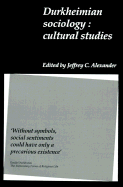Book contents
- Frontmatter
- Contents
- List of contributors
- Acknowledgements
- Introduction: Durkheimian sociology and cultural studies today
- Social change and sacralization
- 1 The sacred and the French Revolution
- 2 From Durkheim to Managua: revolutions as religious revivals
- 3 The Liminal fight: mass strikes as ritual and interpretation
- Micro and macro in symbolic context
- Ritualization and public life
- Index
2 - From Durkheim to Managua: revolutions as religious revivals
Published online by Cambridge University Press: 05 July 2011
- Frontmatter
- Contents
- List of contributors
- Acknowledgements
- Introduction: Durkheimian sociology and cultural studies today
- Social change and sacralization
- 1 The sacred and the French Revolution
- 2 From Durkheim to Managua: revolutions as religious revivals
- 3 The Liminal fight: mass strikes as ritual and interpretation
- Micro and macro in symbolic context
- Ritualization and public life
- Index
Summary
Although an infrequent class of social phenomena, revolutions have been of great interest to students of political modernity and social change. The general breakdown of a social regime and the attempted establishment in its wake of a new social order, all this taking place within a compact time frame, continue to be an intriguing topic of historical and sociological research (Goldstone 1980, 1982; Taylor 1984; Zimmermann 1983).
The low incidence but high interest in revolutions at the macro level bears resemblance to the low incidence but high sociological interest in suicides at the micro level. Needless to say, it is Durkheim who very boldly placed suicide (more correctly, suicide rates) in the sociological consciousness not only by demonstrating that it can be analyzed as a social phenomenon but also that some aspects of it are an ingress to core features of modernity. If this seemingly irrational act can be shown to have socially conditioned patterns, then is it not less plausible to seek a sociological accounting of a collective act – revolution – an accounting that would bring to light underlying patterns operative in historical revolutions? While various paths and models have been used to “make sense” of revolutions (particularly drawing from Marx and Weber), one source that has not been common currency is Durkheim, perhaps because of his image as a founder of “functionalism,” with its conservative connotation.
- Type
- Chapter
- Information
- Durkheimian SociologyCultural Studies, pp. 44 - 65Publisher: Cambridge University PressPrint publication year: 1988
- 13
- Cited by



